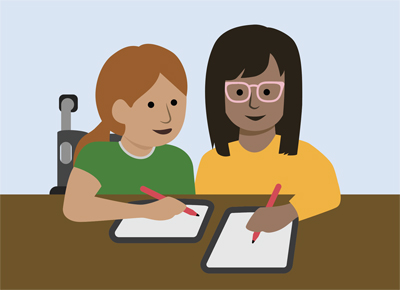Accessible Pathways Project awarded $3.9 million to advance research on multilingual learners with disabilities

FOR IMMEDIATE RELEASE
MADISON, Wis. – The state of Minnesota has been awarded $3.998 million over four years for the Accessible Pathways Project through the Competitive Grants for State Assessments (CGSA) competition. This project aims to better understand and support multilingual learners (MLs) with low incidence disabilities, in this case, students who are blind/have low vision (BLV) and those who are deaf/hard of hearing (DHH).
The Accessible Pathways Project is a collaborative effort led by the Minnesota Department of Education (MDE) and WIDA, an educational services organization within the University of Wisconsin–Madison's School of Education. Dean Reasoner and Jennifer Burton will lead the project on behalf of MDE, while WIDA’s project leadership team includes Laurene Christensen and Edynn Sato as co-principal investigators, and Delis Cuéllar and Jordan Gallant. The states of Arizona and Kansas will also partner on the project.
“We’re excited to lead the Accessible Pathways Project in partnership with WIDA,” said Dean Reasoner, principal investigator from MDE. “By focusing on MLs with low incidence disabilities, we hope to drive meaningful improvements in how these students are assessed and supported, paving the way for greater educational outcomes.”
Building on the work of WIDA’s ALTELLA and Advancing ALTELLA projects, the Accessible Pathways Project aligns with WIDA’s strategic goals to ensure our assessments, products and services are accessible.
“Multilingual learners with disabilities have a right to learn English, and access to assessments is a critical part of that journey,” said Edynn Sato, co-principal investigator from WIDA. “The work we are doing will ensure that our assessments are accessible to all learners, particularly those who have traditionally been underserved.”
Key project activities:
Establish Communities of Practice: The project will bring together educators and other professionals who work with MLs who are BLV and DHH to build educator capacity and understanding of evidence-based best practices and resources.
Data collection: A range of data collection instruments, including interview and observation protocols, Individual Characteristics Questionnaires, and Tell Us About Your Child Surveys, will be developed and implemented to gather critical information about these students that can inform their learning, instruction and assessment.
Ongoing evaluation: The project will implement a continuous evaluation process to assess progress and ensure effectiveness of the project’s initiatives.
WIDA will apply these learnings to future test development projects to ensure that WIDA assessments are fully accessible to MLs who are BLV and DHH.
"The Accessible Pathways Project is a significant step forward in improving assessments for MLs who are blind or have low vision and who are deaf or hard of hearing,” said Laurene Christensen, co-principal investigator from WIDA. “Throughout the project, professionals in the field will come together to learn from each other and develop a new collaborative path for test developers, educators, and all those who support MLs with disabilities to ensure that students find the success they deserve.”
About WIDA
WIDA is an educational services organization within the University of Wisconsin–Madison’s School of Education that advances academic language development and academic achievement for multilingual children to help ensure equitable, quality education.
For media inquiries or further information, please contact:
Hannah Haynes, hrhaynes@wisc.edu





